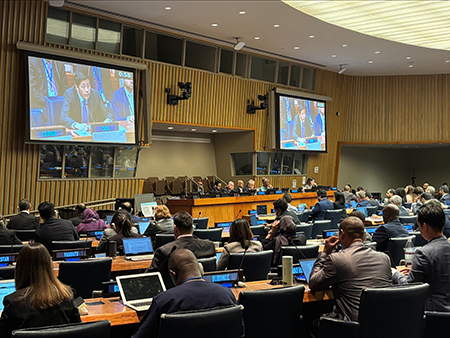States Gather at UN Security Meeting Amid Pressure, Reforms
November 2025
By Shizuka Kuramitsu
The UN General Assembly First Committee, which deals with disarmament and international security, is holding its annual meeting under growing pressure, including the fast-approaching expiration of the New Strategic Arms Reduction Treaty (New START). Discussions also are showing the impact of recent UN reforms and Trump administration policy changes on multilateral nuclear negotiations.

At the committee’s 80th session, taking place Oct. 8 to Nov. 7 in New York, states have gathered to discuss and adopt decisions to renew their commitments to advancing disarmament and maintaining international peace and security.
As the committee convened, a Sept. 22 Russian proposal for Russia and the United States to continue adhering to New START’s central limits remained unanswered, despite U.S. President Donald Trump’s brief acknowledgement Oct. 5 that the measure “sounds like a good idea.” (See, ACT, October 2025.) The treaty, the last remaining brake on the two countries’ strategic arsenals, expires Feb. 5.
Moscow seems impatient for a U.S. response. In comments to reporters while on a state visit to Tajikistan Oct. 10, Russian President Vladimir Putin said, “If the Americans decide they don’t need [an informal extension], that’s not a big deal for us.”
Putin and Trump held a lengthy phone call Oct. 16 and announced a forthcoming summit meeting in Hungary, but after preparatory talks by their foreign ministers, the summit appears on hold.
As this First Committee meeting marks the last opportunity for the member states to gather at a multilateral forum on nuclear disarmament issues before New START expires, non-nuclear weapons countries are organizing to support continuation of the treaty.
Austria once again led efforts with 34 other states on a joint statement on the value of U.S.-Russian arms control, calling for the “urgent commencement of negotiations for a successor agreement and … a return to full and mutual compliance with the limits set by the treaty until such time as a successor pact is concluded.”
“We urge both parties to the treaty to spare no efforts in this regard and all other states to be fully supportive,” Austria added.
Due to UN-wide reforms to streamline operations and increase efficiency, known as the UN80 initiative, this year’s First Committee session has fewer meetings and resolutions.
At the general debate Oct. 9, Paul Watzlavick, senior official for the Bureau of Arms Control and Nonproliferation at the U.S. Department of State, said that “the United States is leading by example” to reduce the number of resolutions and costs at the First Committee to “to reinvest efforts in a streamlined, efficient, fit for purpose, arms control and disarmament architecture that more effectively convenes member states to solve problems.”
“We will not introduce any resolutions of our own this year, and we will continue to request others introduce periodicity into many of the annual resolutions that have not substantially changed from year to year, including those that we have both supported and not supported in the past,” said Watzlavick.
Some resolutions reflected changed policies being pushed at the domestic level by the Trump administration. According to foreign delegations speaking anonymously to Arms Control Today, one resolution that is submitted annually to the First Committee this year was missing references to gender and sustainable development goals, two policies Trump opposes. The references were returned to the draft after negotiations.
Similarly, some delegations highlighted a lessened U.S. engagement compared to the previous years.
The First Committee is chaired by Italy’s ambassador to the UN, Maurizio Massari, who said the committee has extra importance this year because it is the last multilateral debate on disarmament before the 2026 nuclear Nonproliferation Treaty Review Conference.
While acknowledging efforts to improve efficiency and streamline processes, Massari promised to “spare no efforts to foster constructive engagement and ensure the full and smooth functioning of the committee with an inclusive, pragmatic, and forward-looking approach aimed at revitalizing the disarmament agenda not as an abstract goal but as a shared imperative for international peace and security.”
